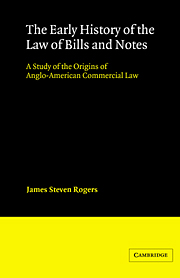 The Early History of the Law of Bills and Notes
The Early History of the Law of Bills and Notes Book contents
- Frontmatter
- Contents
- Preface
- Table of cases and precedents
- Note on citation
- Introduction
- 1 The central courts, commercial law, and the law merchant
- 2 Early exchange transactions: commercial practice
- 3 Early exchange transactions: private law
- 4 Early exchange transactions: public law and policy
- 5 From exchange transactions to bills of exchange: the transformation of commercial practice
- 6 The custom of merchants and the development of the law of bills
- 7 The civilians and the law of bills in the seventeenth century
- 8 Transferability and negotiability
- 9 The law of bills and notes in the eighteenth century
- 10 The problem of accommodation bills
- Conclusion
- Bibliography
- Index
9 - The law of bills and notes in the eighteenth century
Published online by Cambridge University Press: 22 September 2009
- Frontmatter
- Contents
- Preface
- Table of cases and precedents
- Note on citation
- Introduction
- 1 The central courts, commercial law, and the law merchant
- 2 Early exchange transactions: commercial practice
- 3 Early exchange transactions: private law
- 4 Early exchange transactions: public law and policy
- 5 From exchange transactions to bills of exchange: the transformation of commercial practice
- 6 The custom of merchants and the development of the law of bills
- 7 The civilians and the law of bills in the seventeenth century
- 8 Transferability and negotiability
- 9 The law of bills and notes in the eighteenth century
- 10 The problem of accommodation bills
- Conclusion
- Bibliography
- Index
Summary
During the eighteenth century, the courts were confronted with so many cases and issues involving bills that a comprehensive survey of the history of the law in that period could easily occupy an entire volume itself. No effort will be made herein to examine all of the eighteenth-century developments in detail. Rather, this chapter will discuss several of the principal legal issues raised by the structure of the eighteenth-century financial system. The chapter concludes with an assessment of the contribution of Lord Mansfield to the development of the law of bills.
Accustomed as we are today to our modern payment systems, is hard for us fully to appreciate the practical and legal problems presented by the financial systems of earlier times. Indeed, the overemphasis of the concept of negotiability in most accounts of the history of the law of bills is probably attributable to anachronistic assumptions about commercial practice. The holder in due course rules are commonly assumed to have been essential in a world in which private instruments circulated as payment media because people would be unwilling to take an instrument if the original obligor could resist payment by raising defences arising out of the transaction in which it was issued. Implicit in that argument is the assumption that at the time instruments were passed in payment the transferee knew that the person who was expected to pay it was legally bound to do so, and was capable of paying.
- Type
- Chapter
- Information
- The Early History of the Law of Bills and NotesA Study of the Origins of Anglo-American Commercial Law, pp. 194 - 222Publisher: Cambridge University PressPrint publication year: 1995
